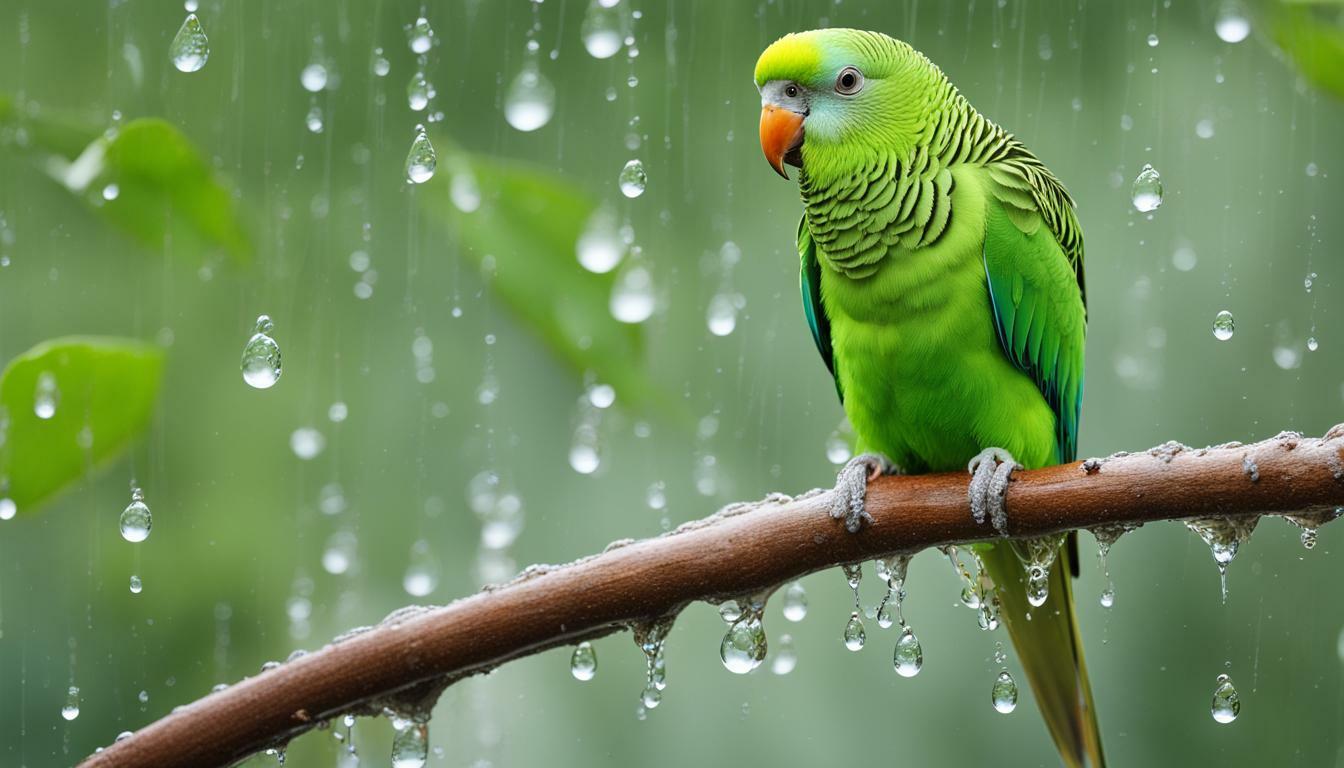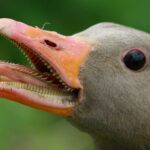Parakeets, like other birds, have a unique way of eliminating waste. Unlike mammals, birds have a single opening, called a cloaca, for both urine and feces. This means that parakeets do indeed pee, but it may not look like the typical urine output that mammals produce.
Parakeet urination habits differ from those of mammals in several ways. For one, they typically pee more frequently, but in smaller quantities. Additionally, their urine is mixed with feces, forming a semi-solid waste called urates. This waste is expelled from the cloaca as a single package, making it difficult to differentiate urine and feces.
Understanding parakeet urination habits is important for maintaining their overall health and hygiene. By monitoring their bathroom behaviors, you can identify potential health issues and ensure that their living environment remains clean and sanitary.
Key Takeaways
- Parakeets do indeed eliminate waste through urination, but their process differs from that of mammals
- Parakeets pee more frequently but in smaller quantities, and their urine is mixed with feces to create urates
- Monitoring parakeet bathroom behaviors is important for identifying potential health issues and maintaining a clean living environment
Understanding Parakeet Urination
Parakeets, like all birds, eliminate waste through a single orifice called the cloaca. This opening serves as the exit point for feces, urine, and reproductive fluids. Unlike mammals, birds do not have separate openings for urine and feces. Instead, they expel both waste materials together through the cloaca.
When a parakeet needs to eliminate waste, it lifts its tail and slightly leans forward. This position helps to open the cloaca, allowing waste to exit more easily. Parakeet urine is clear and odorless, which can make detecting it challenging. If you suspect your bird is peeing outside of its cage, look for damp spots on nearby surfaces or a change in the color or texture of the bedding.
Parakeet feces, on the other hand, varies in color and texture depending on a bird’s diet and health. Healthy bird feces should have a greenish-brown color with a solid shape. However, if the feces are runny or discolored, it may be an indication of health problems that require immediate attention.
It is essential to regularly monitor your parakeet’s bathroom habits. Changes in the frequency, color, or texture of their waste materials can be early signs of illness or infection. If you notice any abnormality, it is best to consult with an avian veterinarian as soon as possible.
Parakeet Bathroom Behaviors
As a parakeet owner, understanding your bird’s bathroom habits can help you maintain its hygiene and avoid potential health issues. Parakeets have natural instincts when it comes to eliminating waste, but it is possible to train them to use a designated area for their bathroom needs. Here are some tips and techniques for parakeet potty training and managing their peeing habits:
Parakeet Potty Training
Parakeets are intelligent birds and can learn to associate a specific area with their bathroom needs. To train your parakeet, choose a particular spot in their cage or play area and place a small tray or paper towel in that area. When your bird eliminates in the designated spot, offer praise and a small treat as positive reinforcement.
Be patient, as it may take some time for your parakeet to understand the potty training concept, and accidents may happen. Avoid punishing your bird for any mishaps and instead redirect them to the designated area and offer praise when they use it correctly.
Parakeet Peeing Techniques
Parakeets eliminate waste in two main ways: through urination and defecation. Unlike mammals, birds do not have a separate urinary tract and instead excrete both urine and feces through the cloaca. This means that parakeet urine and feces are released simultaneously.
Parakeets also have a unique ability to control their urine output and can limit or increase the amount they release based on their hydration needs. They can also hold their urine for longer periods, making them capable of staying dry for extended periods.
It’s essential to be aware of your bird’s natural urination and defecation patterns to maintain their hygiene and prevent any potential health issues. Watch for signs of increased urination or difficulty eliminating waste, as these could be indicators of an underlying health issue and require prompt veterinary care.
By following these tips and techniques for parakeet potty training and managing their peeing habits, you can help your bird maintain proper hygiene and prevent any potential health issues.
Managing Parakeet Pee: Maintaining Hygiene and Toilet Habits
Proper management of your parakeet’s pee and hygiene is crucial to ensure their health and happiness. Parakeets, like all birds, eliminate both urine and feces, and it’s important to understand their bathroom habits to provide them with a clean and healthy environment.
One of the best things you can do to maintain hygiene is to clean your parakeet’s cage regularly. Remove any soiled bedding materials and scrub the cage with hot, soapy water weekly. Be sure to rinse thoroughly and allow the cage to dry completely before returning your bird to their home.
It’s also a good idea to provide your parakeet with appropriate bedding material. Avoid using newspapers or other printed paper, as the ink can be harmful to your bird. Instead, opt for clean, unscented paper or natural materials like wood shavings or sand.
Another important aspect of managing parakeet pee is to monitor your bird’s toilet habits. Pay attention to the color and consistency of their feces and urine, as any changes can be a sign of a health problem. If you notice anything unusual, contact your veterinarian right away.
Overall, maintaining proper hygiene and toilet habits is essential to the health and well-being of your parakeet. By providing them with a clean and safe environment, monitoring their toilet habits, and seeking veterinary care when necessary, you can help ensure that your feathered friend enjoys a long and healthy life.
The Link Between Diet and Parakeet Urination
As a parakeet owner, it’s important to understand the link between your bird’s diet and its urination habits. Providing a balanced and appropriate diet can help prevent potential health issues and ensure your parakeet stays healthy and happy.
Tip: Choose a high-quality parakeet food that contains a variety of seeds, pellets, fruits, and vegetables to provide all the necessary nutrients for your bird.
Feeding your parakeet a diet that is high in protein or lacking in certain nutrients can lead to urinary problems. For instance, diets high in protein can cause an excess of uric acid in the urine, which can lead to urinary tract issues.
To prevent any potential issues, make sure to include a variety of fruits and vegetables in your parakeet’s diet, such as leafy greens, carrots, and berries. Avoid feeding your bird too many seeds or junk food, as they are usually high in fat and lacking the necessary nutrients.
Tip: Make sure to provide fresh, clean water for your parakeet at all times. Change the water daily and clean the water bowl regularly to prevent bacterial growth.
If you notice any changes in your parakeet’s urination habits, such as frequent urination or discolored urine, it’s important to consult with a veterinarian. These could be signs of a urinary tract infection or other health issues.
By maintaining a balanced and healthy diet for your parakeet, you can promote good urinary health and prevent any potential issues down the road.
Maintaining Parakeet Hygiene
Proper hygiene is essential to ensure the good health of your parakeet. Without regular attention, your bird may become vulnerable to urinary infections and other health problems. Here are some parakeet hygiene practices that you should follow:
Regular Bathing
Parakeets love to bathe, and it’s essential to keep their feathers and skin clean to prevent disease and infections. You can bathe your bird by providing a shallow dish of water or misting them with a spray bottle. Make sure the water is lukewarm, and avoid getting water in their eyes or nostrils.
Grooming
It’s important to keep your parakeet’s beak, nails, and feathers trimmed to avoid injury and promote good health. Regular grooming will also help maintain your bird’s hygiene by removing any debris or dirt that may accumulate on their feathers.
Monitoring for Signs of Infection
Parakeets are prone to urinary infections, which can be fatal if left untreated. Keep an eye out for any signs of infection, including discolored urine, lethargy, and loss of appetite. If you notice any of these symptoms, it’s essential to take your bird to the vet right away.
Cleanliness
Keeping your parakeet’s cage clean is one of the most important aspects of maintaining their hygiene. Change the bedding regularly, and clean the food and water dishes daily. Additionally, you should clean the entire cage once a week using a mild soap and water solution.
By following these parakeet hygiene practices, you can ensure that your feathered friend stays healthy and happy. Remember to pay attention to their bathroom habits and overall behavior, as early detection of any health issues can be the key to preventing serious illness.
Conclusion
Now that you know that parakeets do indeed pee, it’s important to understand their bathroom habits and how to manage them. By following proper hygiene practices and providing a healthy diet, you can ensure your parakeet stays happy and healthy.
Remember to take note of their urination and feces patterns, and monitor for any signs of illness. Additionally, regular cleaning of their cage and surrounding environment will prevent any potential health issues. Potty training your parakeet can also be a useful tool in keeping their living space clean and hygienic.
Overall, understanding and managing your parakeet’s bathroom habits is a crucial aspect of responsible pet ownership. By staying informed and taking proactive measures, you can provide the best possible care for your feathered friend and enjoy a happy, healthy life together.
Can Parakeets Talk and Pee at the Same Time?
Parakeets and their ability to talk is a fascinating topic. Many people wonder if parakeets can talk and pee at the same time. While parakeets are known for mimicking human speech, they cannot talk and pee simultaneously. They require undivided attention to articulate words, just like humans.
FAQ
Q: Do parakeets pee?
A: Yes, parakeets do pee. Parakeets eliminate waste through both urine and feces, just like other animals.
Q: How do parakeets eliminate waste?
A: Parakeets eliminate waste by urinating and defecating. Urine is produced by their kidneys, while feces are formed from undigested food in their intestines.
Q: Are there any differences between parakeet urine and feces?
A: Yes, there are differences between parakeet urine and feces. Urine is liquid waste composed primarily of water and uric acid, while feces are solid waste consisting of undigested food and other waste materials.
Q: What are some parakeet bathroom behaviors?
A: Parakeets have natural instincts when it comes to bathroom behaviors. They tend to eliminate waste in specific areas of their cage or aviary. However, with proper potty training, parakeets can be encouraged to eliminate waste in designated spots.
Q: How can I potty train my parakeet?
A: Potty training a parakeet involves consistent reinforcement and rewards. You can use a small tray or perch with absorbent material to encourage them to eliminate waste in a designated area. Positive reinforcement, such as treats and praise, can be used to reward desired behaviors.
Q: How should I manage parakeet pee?
A: To manage parakeet pee, it’s important to keep their cage clean and provide appropriate bedding that can absorb moisture. Regularly cleaning the cage and changing bedding will help maintain their hygiene and prevent any potential health issues.
Q: Is there a link between diet and parakeet urination?
A: Yes, a balanced diet plays a crucial role in a parakeet’s urination habits. Providing a diet rich in fresh fruits, vegetables, and high-quality pellets will help maintain their urinary health. Avoid feeding foods high in salt or sugar, as these can negatively impact their urination.
Q: How can I maintain parakeet hygiene?
A: Maintaining proper hygiene in parakeets includes regular bathing, grooming, and monitoring for any signs of urinary infections or other health problems. Providing opportunities for bathing, such as shallow water dishes or misting with water, will help them keep clean. Regularly check their feathers, feet, and beak for any signs of dirt or infection.
Q: Can you summarize the key points about parakeet pee?
A: Parakeets do pee, and their urine is composed of water and uric acid. Potty training can be implemented to encourage parakeets to eliminate waste in designated areas. Proper cage cleaning and bedding management are essential for maintaining parakeet hygiene. A balanced diet is crucial for their urinary health. Regular bathing and grooming practices are also important for their overall hygiene and well-being.











